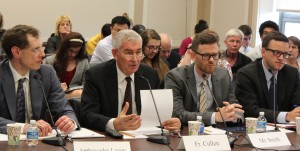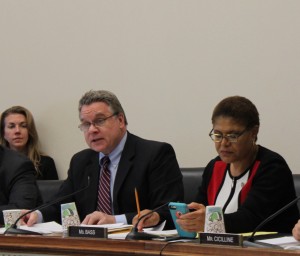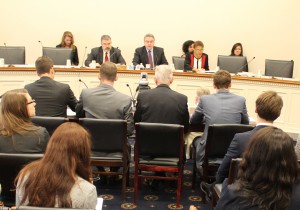US House hearing: PH making only slow progress vs. trafficking

Fr. Shay Cullen, founder of PREDA (2nd from left), testifies about the challenges and successes of anti-trafficking in the Philippines. Testifying with him are (from left) Amb. Mark Lagon, Matt Smith of Forty Rights, and Jesse Eaves of Humanity United. PHOTOS BY JON MELEGRITO
WASHINGTON, DC — The day before the US Senate finally passed a trafficking bill intended to punish perpetrators and increase support for victims, a House subcommittee was holding a hearing on which countries are effectively helping the millions of people who “live in sex or labor slavery today.” Among those countries is the Philippines.
The Philippines retained its 2010 Tier Two classification, which means it is making significant efforts to combat what has been widely known as “modern day slavery.” The Philippines is grouped with Brunei, Indonesia, Singapore and Vietnam.
Countries classified as Tier One fully meet minimum standards. Tier Three countries, like Burma, Russia and Thailand, do not meet standards and are not making significant efforts to do so, and may be subject to sanctions.
In its latest annual trafficking report, the State Department considers the Philippines “not in full compliance with minimum standards,” describing the country as a source for sex-trafficking and forced labor, where “child sex tourism remained a serious problem.” But Among the notable findings: There has been a modest increase in conviction of trafficking offenders, from 25 in 2012 to 31 in 2013.
“Correct tier designations matter, and put governments on notice that the eradication of human trafficking is a U.S. priority,” said Rep. Chris Smith (R-NJ), chairman of the House Committee on Foreign Affairs subcommittee on Africa, Global Health, Global Human Rights, and International Organizations.
“Perhaps most importantly, correct designations acknowledge the suffering of trafficking victims who long to be free,” Smith added. The hearing was held mainly to “evaluate government efforts around the world to prevent trafficking, protect victims and hold traffickers accountable.”

Rep. Chris Smith (R-NJ) explains the purpose of the subcommittee hearing, Rep. Karen Bass (D-Calif) waits for her turn to speak.
Witness panel
In reviewing the Trafficking in Persons Report (TIP), Smith invited a panel of human rights advocates, including Fr. Shay Cullen, president and founder of the Philippine-based Peoples Recovery, Empowerment Development Assistance Foundation (PREDA).
The three other witnesses who testified on April 22 were: Mark Lagon, former ambassador-at-large for Trafficking in Persons; Matt Smith, executive director of Fortify Rights; and Jesse Eaves, Humanity United’s director of Policy and Government Relations.
Cullen, a Catholic Columban missionary from Ireland, is widely known for his crusade to fight trafficking of women and children in the Philippines since the 1980s. He has testified in Congress before about the day-to-day challenges and successes of PREDA’s anti-trafficking work.
In his remarks, illustrated by a slide presentation depicting pictures of street children confined in jail-like conditions, Cullen noted that 40 percent of tourists come to the Philippines for sexual exploitation: “Young people, many underage, are vulnerable and both foreign nationals and locals prey upon them to supply the demand of the thousands of sex tourists.”
Cullen recalled that former US Ambassador to the Philippines, Harry K. Thomas, irritated the Philippine government when he made the same claim about sex tourism two years ago. “The fact remains that the Philippines is a destination for sex tourists despite Philippine denials,” Cullen said.
However, “the Philippine government is striving to address the problem of human trafficking and improve,” Cullen pointed out. “While indeed there is strong political commitment by President Ninoy Aquino, and especially Justice Secretary Leila De Lima, and the office of Ombudsman to fight corruption with some notable success, unfortunately the implementation of this by police and prosecutors results in a very low arrest and conviction rate. In 15 years, only 150 convictions were achieved.”
He added: “Reform of the police and judiciary in the Philippines is of utmost importance. Local government officials who issue permits and licenses to sex bars that take in trafficked persons must be restrained. Trafficked children must have greater protection, shelter and assistance.”
Resurgence in sexploitation
After the panel presentations, Smith asked Cullen about news reports citing the State Department’s contention that the problem of trafficking in the Philippines is not as bad as when the US bases were still there.
“My brother, who was a fighter pilot, used to tell me about sailors on leave flooding the bars in Subic Bay,” Smith said. “When the ships would come in, he was appalled to see a bee-line for sex, leaving behind exploited girls and little children.”
Cullen responded that despite withdrawal of the US bases, there’s still “lots of exploitation going on” in Olongapo, where the naval bases were once located.
“The sailors who once filled the streets on shore leave are no longer here, but the city’s sex trade has not slowed down because it is supported by local officials, prosecutors and judges who are mostly corrupt,” Cullen explained. “And with the US military coming back again with the signing of the Enhanced Defense and Cooperation Agreement, traffickers will find ways to get around the ban on sex bars because they know the tricks of the trade.”
A visibly concerned Smith echoed Cullen’s comment: “So, you’re telling me that with our ships coming in again, there will be a resurgence in sex exploitation.”
In 2010, Smith stressed the importance of the U.S. military’s role and responsibility in “enforcing the zero tolerance policy. If it is our servicemen who are creating the demand, we have to ensure that they stop exploiting the women.”

House Foreign Affairs subcommittee Chairman Chris Smith (R-NJ) opens the April 22 hearing on “Accountability and Transformation: Tier Rankings in the Fight Against Human Trafficking.”
As co-chairman of the U.S. Congressional Caucus on Human Trafficking, Smith has authored three landmark anti-trafficking laws. He has a bill now in the House Subcommittee on Military Personnel that would, he said, “ensure that the Department of Defense has an assistant secretary level director for anti-trafficking policy who would oversee a clear and decisive response.”
The U.S. Justice Department ranks human trafficking as the third largest criminal enterprise worldwide. Trafficking ranges from prostitution, debt bondage to forced labor, exploitation of children as sex slaves or soldiers. In 2007, Philippine government and NGO estimates placed the number of women trafficked at between 300,000 to 400,000. The number of children trafficked ranged from 60,000 to 100,000.
The Philippines was the first country to adopt, in 2003, an Anti-Trafficking in Persons Act. Overall, the Philippines has enough laws, says Researcher Riki Repanis of the University of Nevada. But the problem is implementation. “The net effect seems to be punishment of the girls, not the perpetrators,” Repanis wrote.
In his closing statement, Smith said, “We need to look at ourselves, and ask too whether we are complicit in abetting trafficking, perhaps unwittingly. Countries that do live up to their ideals show they value and treasure their citizens – their greatest resource – and in the long run will benefit the most.”
Like us on Facebook